The 100th anniversary of the First World War is now finished but the records will continue to be preserved at the Archives and accessible to current and future generations who want to know more about the time period. In addition, this blog will remain on our website as an additional resource.
December 2017 Posts:
- 27 December: Russian Revolution and the HBC: Christmas amidst chaos
- 18 December: Christmas menu for Canadian troops training in England
- 11 December: First World War postcards
- 4 December: A Soldier's Farewell
27 December 2017
Russian Revolution and the HBC: Christmas amidst chaos
On December 24, 1917, C.J.R. Small, the HBC’s agent in Archangel, Russia, wrote to the Governor and Committee in London. Small wrote the letter on Christmas Eve, yet makes no mention of Christmas. The October Revolution, the final phase of the 1917 Russian Revolution, took place on November 6-7 (or October 24-25 in the Russian calendar) and saw the Vladimir Lenin’s Bolshevik Party seize power in Russia. Lenin’s Decree on Land, which was passed by the new Soviet congress on 26 October 1917, called for the nationalization of private property and banks, the redistribution of land among Russia’s peasantry, and the seizure of private bank accounts. Market systems collapsed and, as a result, bread and flour were some of the only things being sold openly but at extremely high prices. By December 1917, circumstances in Russia were dire and this is the focus of his letter.
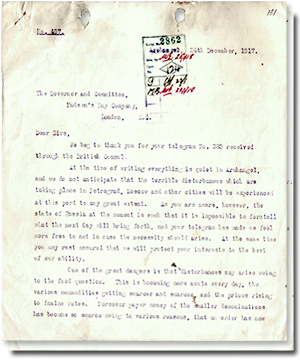
(2 images)
Letter transcript:
No. 497
Archangel, 24th December, 1917
To Governor and Committee,
Hudson's Bay Company,
London, E.C.
Dear Sirs,
We beg to thank you for your telegram No. 383 recived through the British Consul. At the time of writing everything is quiet in Archangel, and we do not anticipate that the terrible disturbances which are taking place in Petrograd, Moscow and other cities will be experienced at this port to any great extent. As you are aware, however, the state of Russia at the moment is such that is is impossible to foretell what the next day will bring forth, and your telgram has made us feel more free to act in case the necessity should arise. At the same time you may rest assured that we will protect your interests to the best of our ability.
One of the great dangers is that disturbances may arise owing to the food question. This is becoming more acute every day, the various commodities getting scarcer and scarcer, and the prices rising to famine rates. Moreover paper money of the smaller denominations has become so scarce owing to various reasons, that an order has now
No. 497 Sheet No. 2.
been issued prohibitin the withdrawal of more than Rbs. 500 a week from the banks by any firm or private individual without the consent of the authorities.
We presume it is only a question of time before a further revolution will take place, when we hope the better instincts of the nation will gain the upper hand, and a more solid basis of Government will be formed.
The news of the sudden closing of the Transport Office, and return home of all the staff, came as a great surprise to us, as it had been intended that some of the staff should remain here all winter. In conjunction with the British Consul we thought it best to wire you this information with the request that you should apply to the Admiralty for further news, presuming that they would tell you why this drastic step should have been taken, in order that you could take the necessary steps to guard your interests.
Yours faithfully,
[signed] C.J.R. Small
He fears more violence to come. He states:
“One of the great dangers is that disturbances may arise owing to the food question. This is becoming more acute every day, the various commodities getting scarcer and scarcer, and the prices rising to famine rates. Moreover paper money of the smaller denominations has become so scarce owing to various reasons, that an order has now been issued prohibitin the withdrawal of more than Rbs. 500 a week from the banks by any firm or private individual without the consent of the authorities.”
Small goes on to wish for stability in the region, hoping that “the better instincts of the nation will gain the upper hand, and a more solid basis of Government will be formed.”
Search Tip: Search “Archangel” in Keystone to find more records.
Feedback
E-mail us at [email protected] with a comment about this blog post. Your comments may be included on this page.
18 December 2017
Christmas menu for Canadian troops training in England
Portage la Prairie soldier Campbell Millar (also featured in 5 September 2017 blog) was training in England in December 1917. The menu for Christmas Day breakfast, dinner and supper is included in his records, held at the Archives, because he sent it home to his parents.
He noted on the back that:
“This was set on the table at dinner Xmas along with a package of cigarettes and an apple for each man. Cam.”
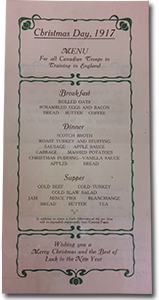
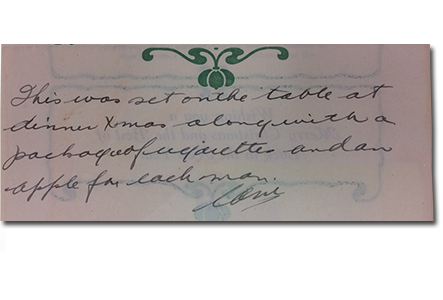
The menu includes a hot breakfast, a roast turkey dinner and a supper of cold meats and the traditional English mince pies.
“In addition”, the menu notes, “a Cash Allowance of 4d. Per Man will be expended regimentally from Canteen Funds.”
On the reverse Lt.-Gen. Turner extends “to all ranks under his command his Heartiest Greetings for Christmas and the New Year.”
Campbell Millar remained in England until April 1918 when he sailed for France. He was in France when the armistice was declared and then went on to Belgium. He departed for Canada in March 1919 and was discharged in April 1919. He enlisted again during the Second World War and again sent letters home to his family in Manitoba.
Search Tip: Search “Campbell Millar” in Keystone to find out more about Millar’s correspondence from the First and Second World Wars.
Feedback
E-mail us at [email protected] with a comment about this blog post. Your comments may be included on this page.
11 December 2017
First World War postcards
In November 1917 Herb Francis (previously featured in our 24 July 2017 blog), was wounded and sent to England for medical attention, “Blighty” as it was known to the soldiers. He continued to write to his family, updating them about his location, condition and whether he would be returning to Canada soon.
In December 1917, Herb wrote several letters and postcards to members of his family. The letters speak of feeling homesick when thinking of past Christmases at home and wishing he could be there with them. The postcards, drawn by T. Gilson, one of a number of artists designing comical and satirical First World War postcards, are less serious and more humorous.
On the first postcard which Herb sends to his sister in Headingley, Manitoba, two wounded soldiers are enjoying Blighty – “Good old Blighty”.
Herb wrote on the reverse:
“Dear Etta,
That’s me with the cigar. Don’t I look comfortable in Blighty?
Yours, Herb.”
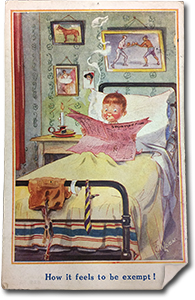
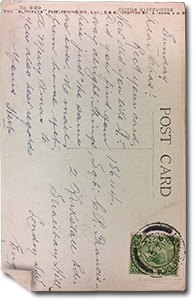
(2 images)
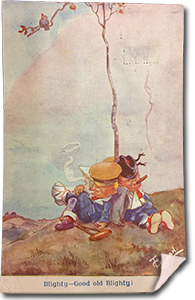
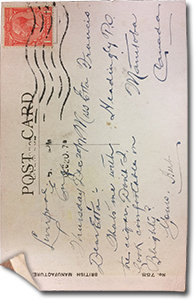
(2 images)
On the second postcard, a boy is pictured enjoying exemption from military service, reading the newspaper in bed while smoking a cigarette. Herb sent this postcard to his brother, Charles, who was serving in France but was on leave in London over Christmas.
He reports that:
“Things here just the same as ever. No mail from home yet.
A Merry Xmas to you also best regards,
Yours Herb.”
Search Tip: Search “Sarah Margaret Francis” or “Charles Ross Francis” in Keystone for more information on the Francis family and their First World War records.
Feedback
E-mail us at [email protected] with a comment about this blog post. Your comments may be included on this page.
4 December 2017
A Soldier's Farewell
Alexander Logan Waugh was the second son of Richard Deans Waugh, Winnipeg’s mayor in 1912, 1915 and 1916. Like his elder brother Douglas, Alexander Waugh served in the Lord Strathcona’s Horse during the First World War. Waugh served in France from March 1916. In 1917, he was a lieutenant in the machine gun squadron of the First Canadian Cavalry Brigade.
Waugh wrote regular, descriptive letters home to his family sharing his experiences, his thoughts, and his feelings. Before going into battle, Waugh had a habit of writing farewell letters home in case he was killed; when he returned from battle he would tear them up. However, on 17 November 1917 Waugh wrote a farewell letter to his father which he decided to send:
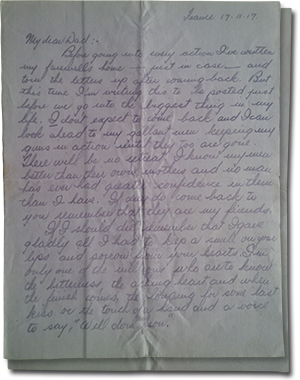
(2 images)
“Before going into every action I’ve written my farewells home ––– just in case ––– and torn the letters up after coming back. But this time I’m writing this to be posted just before we go into the biggest thing in my life. I don’t expect to come back and I can look ahead to my gallant men keeping my guns in action until they too are gone. There will be no retreat. I know my men better than their own mothers and no man has ever had greater confidence in them than I have. If any do come back to you remember that they are my friends.
If I should die, remember that I gave gladly all that I had to keep a smile on your lips and sorrow from your hearts. I’m only one of the millions who are to know the bitterness, the aching heart and when the finish comes, the longing for some last kiss or the touch of a hand and a voice to say, ‘Well done my son.’
And so – good-by.
With my heart full of love and my face turned to the long, long years before I meet you, somewhere on the Other Side, Allie.”
In fact, this was not Waugh’s final letter. Although he was briefly reported missing, Waugh survived being stranded in No Man’s Land for seven hours an ordeal he described in his final letter home on 28th November.
Three days later Waugh was killed in action near Gouzeaucourt on 1 December 1917.
Search Tip: Search “Waugh family” in Keystone for more information on the Waugh family and their First World War records.
Feedback
E-mail us at [email protected] with a comment about this blog post. Your comments may be included on this page.



